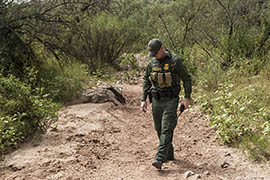Border Patrol mission continues during shutdown, even if pay does not

Cronkite News
WASHINGTON – The government shutdown is no shutdown for border patrol agents, whose law enforcement and life-saving duties do not take a hiatus – even though their pay might.
While Congress acted quickly to ensure that military pay continues uninterrupted, the other “essential” federal workers who are still on the job – including more than 52,000 of the 59,000 Customs and Border Protection employees – will not be paid until the government reopens, whenever that may be.
For border patrol agents, the possibility of working for weeks while waiting for back pay is a “slap in the face,” said Shawn Moran, vice president at large of the National Border Patrol Council, the union representing agents.
“We’re all out here serving our country, whether it’s overseas or on the border,” Moran said.
It comes just months after agents offered wage concessions to narrowly avoid furloughs and suspension of overtime pay under across-the-board spending cuts in April known as sequestration.
Moran said going without a paycheck adds to the strain on the agents, some of whom live paycheck to paycheck, “yet they’re required to show up for work.”
“The biggest concern is not getting paid,” Moran said, adding that “nobody’s getting rich doing this.”
But it is not just the gap in pay that Moran is concerned about. He said the longer the shutdown lasts, the more likely it is to cause gaps in security along the border as agents are pulled back to cover for the “nonessential” employees who have been furloughed.
Despite the shutdown, many federal employees continue to work because their jobs are considered necessary for “safety of life and protection of property.” Like servicemen and women, border agents are included in the ranks of essential employees.
CBP employed more than 6,700 people in Arizona as of July, according to government figures. How many of those have been furloughed is not clear – CBP referred questions to the Department of Homeland Security, which provided only a written statement.
“Port of entry operations, including CBP cargo security and revenue collections, as well as border security programs, including Border Patrol and CBP air and marine operations, remain operational under a government shutdown,” Homeland Security spokesman Clark Stevens wrote in an email.
The roughly 6,900 nonessential workers throughout CBP work in areas such as finance, human resources and acquisitions, said Ron Colburn, who was deputy chief of Border Patrol from 2005 to his 2007 retirement.
“It doesn’t mean that that business just simply goes away,” Colburn said. “What they do is extremely essential to the survival of any organization.”
Government shutdown furloughs mean that the only people left to take care of those support functions are what Colburn called the “gun-toting, badge-wearing, uniformed” border patrol agents. If that happens, he said, that results in “badges away from the border.”
Despite concern over the furloughs, Colburn said he has confidence in Border Patrol’s leadership in Arizona.
“Chief (Manuel) Padilla in Tucson and Chief (Stephen) Martin in Yuma were preparing for this moment, so they will as wisely as possible deploy their finite resources,” Colburn said.
That could mean fewer agents patrolling the border, but it also affects other areas, Moran said.
“I think the biggest impact we’re going to see right now is prosecutions … and also training,” he said. “Training’s basically canceled until further notice.”
Also canceled until the shutdown ends: all leave, tours, ride-alongs, media postings and more. And that may not be all, if the shutdown drags on more than a couple weeks, Jeff Everly said.
Everly, vice chairman of the National Association of Former Border Patrol Officers, said that during the 21-day government shutdown in 1995, agents faced fuel shortages and had problems procuring everything from replacement parts for patrol vehicles to AAA batteries.
At home in Yuma, he and his family tapped into savings and tightened their belts. He said it was “a pain in the butt,” and all of it had an impact on morale.
“If you go to work and you’re not sure how things are going to change for you, (and) you may not have money for fuel or training,” Everly said that “seed of doubt” could begin to affect operations.
Those operations are critical, Colburn said, because without proper staffing on the border, state and local police have to take up the slack until Congress either passes a budget or agrees to a temporary funding measure.
“Crime never stops,” Colburn said. “Criminal organizations, both sides of the border, never stop trying to find vulnerabilities that they can then take advantage of.”















